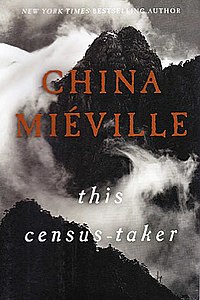This Census-Taker
by China Miéville
A boy witnesses a violent confrontation in his house. He flees downhill to a town and initially reports that his mother has killed his father, before amending his story and stating that his father killed his mother. Two volunteer law officials go up the hill to investigate, leaving the boy in the care of street urchins with whom he is friends. The volunteers return after seeing no evidence of violence, and report a letter purportedly from the mother saying that she was leaving. They return the boy to his father's care.
The narrative shifts to the past. The relationship between the boy's parents was tense, and he occasionally witnesses the father killing animals and throwing the corpses into a crevasse in a nearby cave. The boy suspects that his father has also killed people in the same way. His mother grows crops and takes them to the town to trade, and to scavenge in the deserted areas of the settlement. In conversations with the boy, she says that his father came from a city, wanting to escape from it. His father makes keys for the townspeople who come to visit him, which have magical properties attributed to them.
The present-day boy fears his father, still believing that he has killed his mother and that he has hidden the body in the hole within the cave. He attempts to run away, crossing the bridge to the other half of the town with the street children. They are followed and after being beaten by an official, the boy is collected by the father. One day, when his father is away, a man with a gun identifying as a census-taker appears. He claims to be from the father's city and is responsible for locating and accounting for its inhabitants. He descends into the hole after hearing of the boy's belief as to his mothers fate, although what he finds is not revealed. He tells the boy to hide himself while he awaits his father’s return. After some time, the census-taker reappears and out of sight of the boy, drops something else into the hole. He then asks if the boy wishes to leave with him and become his associate. The boy agrees.
Sections set in the future imply that the boy has been imprisoned and is recording the information that he has collected in three books. He had a predecessor who also worked with the census-taker, whose fate is unclear and may have been present in the town during the events of the past. A coded message within the book he is writing states that the census-taker was rogue.
